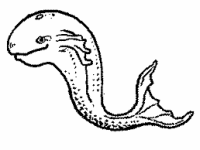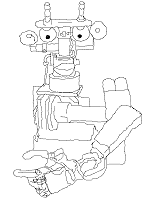 … it’s AGI now. I was interested to hear via Robots.net that Artificial General Intelligence had enjoyed a successful second conference recently.
… it’s AGI now. I was interested to hear via Robots.net that Artificial General Intelligence had enjoyed a successful second conference recently.
In recent years there seems to have been a general trend in AI research towards more narrow and perhaps more realistic sets of goals; towards achieving particular skills and designing particular modules tied to specific tasks rather than confronting the grand problem of consciousness itself. The proponents of AGI feel that this has gone so far that the terms ‘artificial intelligence’ and AI no longer really designate the topic they’re interested in, the topic of real thinking machines. ‘An AI’ these days is more likely to refer to the bits of code which direct the hostile goons in a first-person shooter game than to anything with aspirations to real awareness, or even real intelligence.
The mention of ‘real intelligence’ of course, reminds us that plenty of other terms have been knocked out of shape over the years in this field. It is an old complaint from AI sceptics that roboteers keep grabbing items of psychological vocabulary and redefining them as something simpler and more computable. The claim that machines can learn, for example, remains controversial to some, who would insist that real learning involves understanding, while others don’t see how else you would describe the behaviour of a machine that gathers data and modifies its own behaviour as a result.
I think there is a kind of continuum here, from claims it seems hard to reject to those it seems bonkers to accept, rather like this…
| Claim: machines… | Objection |
| add numbers. | Really the ‘numbers’ are a human interpretation of meaningless switching operations. |
| control factory machines. | Control implies foresight and intentions whereas machines just follow a set of instructions. |
| play chess. | Playing a game involves expectations and social interaction, which machines don’t really have. |
| hold conversations | Chat-bots merely reshuffle set phrases to give the impression of understanding. |
| react emotionally | There may be machines that display smiley faces or even operate in different ’emotional’ modes, but none of that touches the real business of emotions. |
Readers will probably find it easy to improve on this list, but you get the gist. Although there’s something in even the first objection, it seems pointless to me to deny that machines can do addition – and equally pointless to claim that any existing machine experiences emotions – although I don’t rule even that idea out of consideration forever.
I think the most natural reaction is to conclude that in all such cases, but especially in the middling ones, there are two different senses – there’s playing chess and really playing chess. What annoys the sceptics is their perception that AIers have often stolen terms for the easy computable sense when the normal reading is the difficult one laden with understanding, intentionality and affect.
But is this phenomenon not simply an example of the redefinition of terms which science has always introduced? We no longer call whales fish, because biologists decided it made sense to make fish and mammals exclusive categories – although people had been calling whales fish on and off for a long time before that. Aren’t the sceptics on this like diehard whalefishers? Hey, they say, you claimed to be elucidating the nature of fish, but all you’ve done is make it easy for yourself by making the word apply just to piscine fish, the easy ones to deal with. The difficult problem of elucidating the deeper fishiness remains untouched!
The analogy is debatable, but it could be claimed that redefinitions of ‘intelligence’ and ‘learning’ have actually helped to clarify important distinctions in broadly the way that excluding the whales helped with biological taxonomy. However, I think it’s hard to deny that there has also at times been a certain dilution going on. This kind of thing is not unique to consciousness – look what happened to ‘virtual reality’, which started out as quite a demanding concept, and was soon being used as a marketing term for any program with slight pretensions to 3D graphics.
Anyway, given all that background it would be understandable if the sceptical camp took some pleasure in the idea that the AI people have finally been hoist with their own petard, and that just as the sceptics, over the years, have been forced to talk about ‘real intelligence’ and ‘human-level awareness’, the robot builders now have to talk about ‘artificial general intelligence’.
But you can’t help warming to people who want to take on the big challenge. It was the bold advent of the original AI project which really brought consciousness back on to the agenda of all the other disciplines, and the challenge of computer thought which injected a new burst of creative energy into the philosophy of mind, to take just one example. I think even the sceptics might tacitly feel that things would be a little quiet without the ‘rude mechanicals’: if AGI means they’re back and spoiling for a fight, who could forbear to cheer?

 I was thinking about the New Mysterian position the other day, and it occurred to me that there are some scary implications which I, at any rate, had never noticed before.
I was thinking about the New Mysterian position the other day, and it occurred to me that there are some scary implications which I, at any rate, had never noticed before. l was interested recently to
l was interested recently to 
